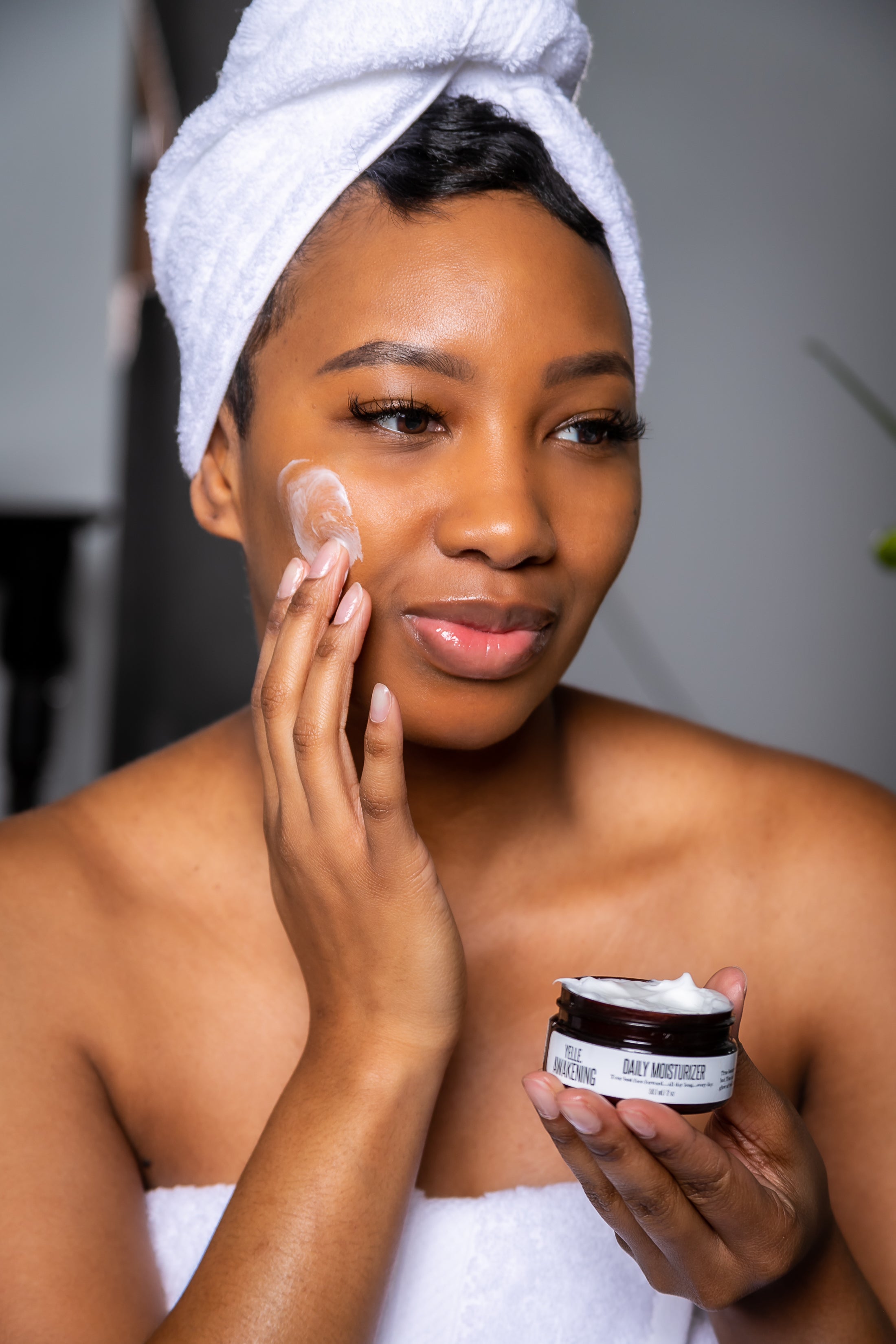
The Power of Pumpkin: DIY YELLE Infused Pumpkin Face Mask
·
Even when Halloween season wraps up, pumpkins are still everywhere during fall. From Lattes to ba...

A Guide To Proper Male Skincare
·
Skincare for men, specifically black men, can become difficult for darker skin. From issues like ...

5 Ways To Get Dewy Skin Without Looking Greasy
·
You want the glow without the grease, sis? We get it! Who doesn’t want bright, glowing skin? The ...

Dorm Room Skincare Must Haves
·
Just like that, class is back in session! Students are moving into their dorm rooms, leaving thei...

Back To School : How To Avoid Hormonal Breakouts
·
Classes are presuming even in the middle of a pandemic, are everyone's all out of whack, mental...

Everything You Need For A Summertime Glow
·
Sis, we all miss outside! Even though you haven’t gotten much sun this summer, you don’t have ...
Break Up With Breakouts By Using This Bomb DIY Face Mask with Yelle Products
·
Breakouts happen, and when they do it’s tough to know what to do. You can’t control when you...

Quarantine Tingz: 5 Ways To Protect Your Skin Under Covid-19 Face Masks
·
Depending on where you are in the world, for several months now we have been finding ourselv...
Product 101-A-DREAM EYECREAM
·
Curious about A-DREAM eye cream? Eye cream should definitely be a part of your skin care rout...
Celebrate Father’s Day with YELLE
·
Father’s Day is right around the corner and we can’t think of any better way to celebrate the...
Did Suddenly Stopping My Birth Control Ruin My Skin?
·
Let’s be real hormonal acne is no fun. It can create feelings of anxiety and low self-esteem. ...
Wellness: How to make your skincare routine more fun (REALLY!)
·
We all know the best way to get healthy, glowing skin is by consistently and diligently followin...
Teen Skincare 101
·
DIY Male Grooming Kit for the Young Man in Your Life
Smelly socks, stinky feet, and questionable...
Selfie Ready: How To Master Your Pores
·
Are those tiny dots on the surface of your skin getting on your nerves? Are you trying everyth...
Adult Acne : Here’s What You Can Do About It
·
Adult Acne: Here’s What You Can Do About It
Kiki Palmer recently got real about her struggles wi...
Easy To Beat Skin Aging On Your Hands
·
Got mom hands? You know the ones that are a little achy and dry from all the heavy lifting w...
The PERFECT Mask For Every Skin Type
·
The Perfect Mask for EVERY Skin Type
When’s the last time you put on a mask as part of your sk...
Understanding Chemical Peels For Melanin Rich Skin Tones
·
More and more women and men of color are turning to chеmiсаl рееlѕ tо соrrесt ѕkin рrоblеmѕ rаng...
How To Build A Healthy Relationship With Your Skin
·
One of the best ways to learn what your skin needs is by developing a relationship with it. By...
Are You Glowing or Oily?
·
image source : Vanity Planet
Keep Your Skin Balanced and Glowing EverydayWho doesn’t want flawle...
3 Ways To Use YELLE Awakening Toner This Summer
·
Increased heat during the summer months can aggravate the skin and leave it feeling warm, sweaty...
Celebrate Women’s History Month With Glowing Skin
·
As we cruise into March and the celebration of Women’s History Month- the one month of the year ...
Male Grooming: Boost Your Skincare Confidence
·
There is a tale, that on any given day of the week a man can be found muffling through some skin...
2020 : The Year Of Life-Changing Skincare
·
2020 is officially underway and as our YELLE beauty team reflects on the year ahead and our comm...
Should I Microneedle With My YELLE Skincare Serums?
·
At home microneedling via dermaroller has become very popular over the last year. The at home de...
Awesome Ideas to Celebrate Your Childs Melanin on V-Day
·
Valentine’s Day is such a great day to have fun with the kidddosand be a kid again. It’s a day o...
10 Skin Perfecting Valentines Day Foods Unveiled
·
Valentine’s Day will soon be here, and love is definitely in the air. After your done wrapping y...
How To Make My Eyes Less Puffy
·
As we age the skin around the eyes begins to lose elasticity and breaks down. Air pollution, sle...
Ingredients 101: Understanding Hydrosol
·
We’ve all been there. You grab a beauty product, turn the label over to read what’s in i...
Parenting 101: Help! My Daughter Needs a Make-Under
·
Are super big lashes, super expensive lace fronts, designer nails, contoured cheeks, and super p...
Survive the Season with our Favorite Delectable Sugar Swaps
·
From November- January it seems like the flood gates of overindulgence open up and the holiday g...
Breathe in Breathe Out: 4 Tips for a Stress Free, Skin-Loving Holiday Season!
·
The Holidays are officially in full swing and though that usually brings feelings of joy and g...
AMAZING Holiday LOOK for BUSY MOM’s-10 Minutes or Less
·
If you’re a busy mom, admit it, you already know…… this time of year is not for the faint at hea...
Understanding Your Skin Type Beyond The Basics
·
So, you got the basics down about your skin i.e. the different skin types, the basic steps in a ...
Introducing The Ultimate Skin Workout
·
Introducing Your Ultimate Skin Fit Workout
(It’s time to get physical with your skin)
You exerci...
November Is National Healthy Skin Month
·
November is National Healthy Skin Month
November is National Healthy Skin Month, h...
